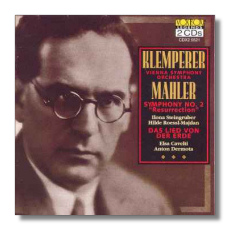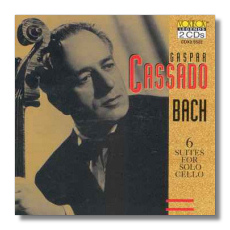
The Internet's Premier Classical Music Source
Related Links
- Latest Reviews
- More Reviews
-
By Composer
-
Collections
DVD & Blu-ray
Books
Concert Reviews
Articles/Interviews
Software
Audio
Search Amazon
Recommended Links
Site News
 CD Review
CD Review
Vox Legends

Gustav Mahler
- Symphony #2 in C minor "Resurrection" *
- Das Lied von der Erde **
* Ilona Steingruber, soprano
* Hilde Roessl-Majdan, alto
** Elsa Cavelti, mezzo-soprano
** Anton Dermota, tenor
* Akademie Kammerchor
* Singverein der Musikfreunde
Vienna Symphony Orchestra/Otto Klemperer
Vox Legends CDX2-5521 A?D monaural 2CDs 75:39, 52:23


Johann Sebastian Bach
- Suites for Solo Cello, BWV 1007-1012
Gaspar Cassadó, cello
Vox Legends CDX2-5522 A?D monaural 2CDs 62:03, 70:07
There was a time when a new Mahler recording was a Big Event for devoted Mahlerians, who were much less numerous than they are today. Today, new releases come, and usually are more-or-less forgotten, with a frequency that would have astonished record collectors at the beginning of the LP era. When Klemperer recorded this "Resurrection" and Das Lied von der Erde for Vox in 1951, he was going where few conductors had gone before. In that sense, these recordings are truly historic. However, they now have little to offer today's listeners except nostalgia or a document of how slapdash early recordings could be. Were it not for the frequent and jarring tape edits, one would think that this "Resurrection" was done in one a single take, so peril-filled is the orchestral playing. Klemperer's account of the score is virile and dramatic (and quite unlike his final EMI recording of the work). Although the soloists are good, there's simply not enough orchestral assurance and polish to make this recording a strong contender, even among other "historic" recordings of the work (including the conductor's conceptually similar but better played and recorded Royal Concertgebouw performance on London). As for Das Lied, at 52:23, this is the fastest recording I've ever heard of the work. Surprisingly, it seldom sounds rushed, but it lacks the autumnal quality that Klemperer would give it later on, again for EMI. Dermota is lyrical, albeit over-parted, in the first song, and Cavelti is quavery and not very interesting.
Gaspar Cassadó's 1957 recordings of the Bach cello suites have a great deal more to offer. This hardly was heavily trodden ground either, but Cassadó was at a disadvantage because of the mark that fellow Spaniard Pablo Casals already had made in this music. Still, Cassadó knew his way around this music. His accounts are grave and measured, and his tone has plenty of "buzz," so his playing never gets cloying. Cassadó is best with the Préludes and the sarabandes; some of the quicker movements don't dance like they can under other bows. This is Bach for the late hours after one puts down the philosophy book and picks up the glass of rare sherry. Apart from some hiss, the sound is more than acceptable; in fact, it's rather pleasantly close and intimate. This is a good buy at Vox Legends' prices, if stereo is not a concern.
Copyright © 1998, Raymond Tuttle


















